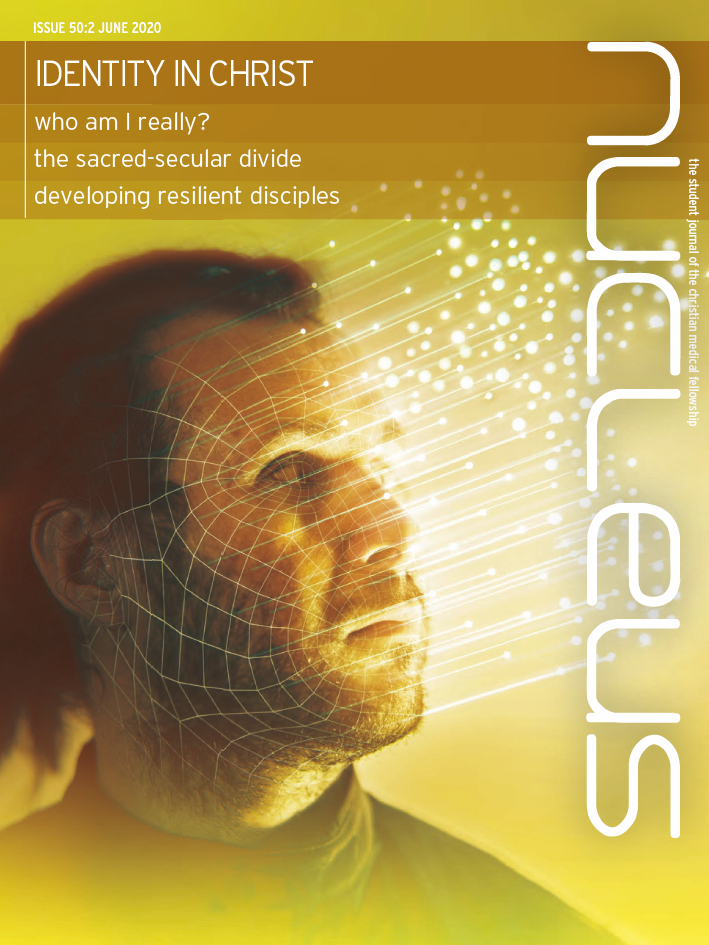Laurence Crutchlow is CMF Associate Head of Student Ministries and a GP in London
Will
Psychiatry? Will loves it. Yes, Freud is a bit strange, but 10 am starts mean Will can read a full four chapters of the Bible each morning, get through all his PrayerMate items, as well as the church missionaries and Bible translators prayer list, not to mention petition for three friends he hopes to bring to a CU event later this term. If only their regular pub night didn't clash with the church prayer group he dutifully attends after CMF meetings, he might even get a chance to invite them!
Will loves spotting psychiatric patients who need to hear the gospel, though he finds it very hard to know how to talk about these things on the wards. Last night he left feeling very guilty, as he'd spent 40 minutes with a man in hospital for the first time. Their chat really reassured the patient, but they didn't talk about Jesus. Will worries that there's no point in being on the wards if he can't share Christ. At CMF tonight he's going to ask friends to pray for more boldness in evangelism in clinical settings.
Jim
Jim is on a surgical placement. He never intended to be a surgeon, but likes theatre more than he expected to, and enjoys seeing patients who were very ill on admission leave the ward looking much better a few days later. The early starts mean that his 'four chapters before work' Bible routine honed during pre-clinical years has changed, but he's learning a lot from meditating over shorter passages on the bus to the hospital. He found himself talking about his faith with a porter who he happened to get chatting to one Friday, even though he wasn't really 'trying' to share the gospel. It turned out that the porter had spotted him pausing for a couple of minutes to talk with an elderly patient after taking blood - the porter couldn't remember when he'd last seen a student do that and asked why.
Both Jim and Will were on CMF committee last year. Jim has always really admired Will's dedication and wished he could be as faithful as him. Will loves being around Jim as he seems so relaxed, though he does worry when Jim prioritises musical theatre society socials over the CU choir. But Will wonders after they talk at that evening's CMF meeting why Jim is the one who had a conversation about the gospel that day, when surely Will is trying much harder, isn't he?
Of course, our conversations are in God's timing not ours, and may not be quite so related to our every move as we think. But there is a deeper issue in play that might explain why Jim has things a bit better sorted than Will.
Jesus is Lord over all
'The Son is the image of the invisible God, the firstborn over all creation. For in him all things were created: things in heaven and on earth, visible and invisible, whether thrones or powers or rulers or authorities; all things have been created through him and for him. He is before all things, and in him all things hold together.' (Colossians 1:15-17)
In Jesus, all things were created. In Jesus, all things hold together. So, it follows that Jesus is Lord over all. How do we define all things? Surely as 'everything in all creation'! When Paul says, 'whatever you do, do it all for the glory of God' (1 Corinthians 10:31), it really means 'whatever'. Not just prayer or Bible study, but music (not just 'Christian' music), art, medicine, politics, cricket, or bike maintenance.
do we really, in our hearts, believe this?
Consider our thinking. When we think of 'Christian medicine', we might quickly think about the ethics of abortion and cloning, both important matters. Do we so quickly consider what God has to do with the Krebs cycle, or the mechanism of action of amoxicillin? What does the Bible tell us about how to manage a hospital?
Look at how we live. Does 10.30 on Sunday morning appear substantially different to 10.30 on Monday? [1] Are you the same person at these two times? Is your language the same? Is your attitude similar? Do you sense that you are walking with God at both times?
the sacred-secular divide
Our lives often do not demonstrate a confidence or understanding that Jesus is really Lord over all.
It is easy to go into 'sacred' mode, and confine God to certain activities. Church may be obvious, but for Will at least other things fall into the 'sacred' column — CU or CMF meetings; music (so long as it is 'Christian' enough); reading certain books; speaking in Christian jargon that others do not understand. All these (except perhaps the last) are good things.
But when we class some things as 'Christian', we necessarily imply that other things are not. This is not about sin, but about things that are good, but just not 'sacred'. For example, Jim's musical theatre society, or reading a book by an author who is not a Christian, or spending a Saturday climbing a mountain; and, of course, most medical study and practice.
But doesn't that seem reasonable? Surely, we need to prioritise God. Shouldn't we guard against too much of the secular, in case the sacred gets squeezed out?
a divided life
A sacred-secular divide in our life causes problems.
First, consistency. Think back to the question about 10.30am on Sunday and Monday. Some inconsistencies might be obvious, like joining in gossip on the ward round, or temptations to join in swearing in [2]. But others may be more subtle. We do not talk about church when asked what we did last weekend because we are now in a secular place where we do not think of that. Or we never realise that we share a burning interest in Italian opera with a friend in our Bible group because opera is secular, and we do not talk about that in a church meeting.
Second is a more serious implication - a gradual but growing disillusionment with medicine. If we (rightly) attach a high priority to personal holiness and evangelism, it can be hard to stay motivated when spending most of our waking hours on something that we do not see contributing to that. We might feel this especially when it is hard to discuss faith at work; but if we see work as peripheral to our faith, the chances are that we will not discuss our beliefs with those around us. We can start to wonder why we put lots of time into learning the causes of chronic liver disease when that patient with Wilson's Disease is more interested in a chelating agent than the gospel, even though he needs both.
Third, and most significant, a theological implication, which can have a major effect on how we live.
It is easy to reduce 'sharing the gospel' to the delivery of a packaged presentation, whether that's a talk outline (like God-Man-God), [3] a set of drawings like two ways to live,[ 4] or other such things. And before going any further I must emphasise that sharing the gospel is never less than using words and explaining the scriptures.
Jesus often explained the gospel - sometimes to a group, sometimes in one-to-one conversations (for example with Nicodemus). [5 But in his earthly ministry, he also demonstrated and lived out what he taught. I am thinking of his day-to-day interactions, rather than dramatic healings; for example, his sadness at hearing of Lazarus' death [6] and even Jesus' care for his mother as he was dying. [7] Jesus not only talked about the Kingdom of God, but demonstrated it.
It was not just when he went to the synagogues or gave a sermon. It was in the day-to-day matters of life. When he was teaching, the illustrations in his talks used far more illustrations relating to everyday life (often agricultural) than illustrations about temple sacrifices or ritual, which would have been the 'sacred' things of his time.
Of course, an individual response to the gospel is vital; the disciples are asked explicitly 'who do you say I am?' (Mark 8:29) Entry into God's kingdom is never less than a personal acceptance of Jesus' death, repentance of our sins, and living for him. But if we only talk about these things on an individual level, we can miss the bigger story of which we are a part. Jesus' plan is for the whole world, to bring everything in unity under him. [8] We will have new 'resurrection bodies', [9] as part of the bigger story of a new heaven and a new earth. [10]
What has that to do with avoiding a sacred-secular divide? It is about perspective. If we focus heavily on the 'sacred', much of this can look inward, to our own lives, and our own relationship with God. If we are constantly reminded that the whole creation will be renewed, [11] we are more likely to remember that Jesus is truly Lord over all and live consistently in that knowledge.
looking outwards
So, if our lives are going to reflect all the glory of the gospel, others need to see that our faith really informs all that we do. It cannot be something private, only kept to a small 'sacred' area of our lives. It must pervade everything in which we are involved. What might this look like for Will and Jim?
Will needs to think about how his faith relates to all his interactions with patients and colleagues, whether 'gospel conversations' or not. This will help him to value the good things he does when he spends time with patients and feel less discouraged. With less pressure to get the gospel into every single conversation, his interactions will be more natural, and more likely to lead to significant discussion. An understanding that the Lord cares deeply about Will's work is likely to make him far more motivated in medicine and find that the strength of his personal faith has much more impact on those around him.
Although Jim on the surface may have a less divided lifestyle than Will, a clearer understanding that Jesus is Lord over all might take away that nagging guilt about spending time with friends when he could be at a 'Christian' event, particularly when it is the fourth one that week! It will fuel his motivation to 'pause' with patients on the ward, realising that this good care for them expresses Jesus' love and may lead to questions about why he does these things.
Most importantly, both will really live out the gospel if they see Jesus truly as Lord over all - they will share truth in both their words and their lifestyles, reflecting well what Jesus himself did.
Some worry that by encouraging broader thinking, people might be less motivated in the good things that we describe as 'sacred', like Bible reading or personal prayer. In fact I think just the opposite is the case, with a more consistent life being likely to lead to a greater hunger to understand God's Word, and also a faith that is still able to 'keep going' during busy career times when we may seem to do little other than medicine. All the principles here can equally apply in nursing or midwifery.
The ultimate aim for Will, Jim, and all of us, is not simply to be medical students who happen to be Christian, nor merely Christians who happen to study medicine, but genuinely Christian medical students, who have a single identity formed in Christ that permeates all parts of their lives.
Jesus not only talked about the kingdom of God, but demonstrated it
































